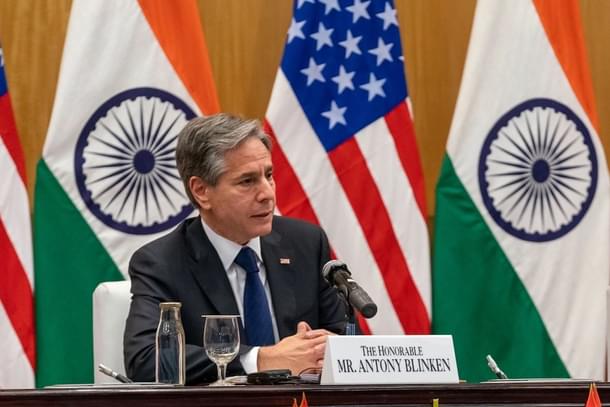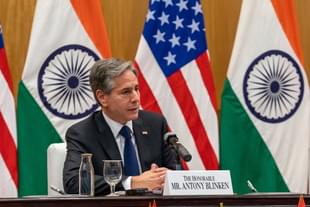World
Antony Blinken Visited New Delhi, And Brought Some Reality Checks With Him
Venu Gopal Narayanan
Jul 29, 2021, 10:40 PM | Updated 09:45 PM IST
Save & read from anywhere!
Bookmark stories for easy access on any device or the Swarajya app.


American Secretary of State Antony Blinken’s two-day visit to New Delhi this week was closely shadowed by hubbub in disparate spheres. The most strident agitations were from the Left Liberal jamaat, who expected Blinken to rap India sharply on the knuckles for a variety of misdemeanors, like a school marm chastising a truant ward.
Long, anguished op-ed pieces competed with desperate tweets for readers’ attention so fervently, that one might have been forgiven for thinking that an Occidental reprimand was the sole agenda point on Blinken’s visit. This time, yea, this time, President Biden’s chief envoy would surely deliver a rocketing for the ages.
That was odd, because the real world was, in fact, buzzing with diplomatic activity, as a number of state and non-state actors sought to bookend Blinken’s visit to New Delhi, by posing in richly-symbolic postures on the world stage.
Chinese Premier Xi Jinping, for example, made a dramatic visit to Nyingchi airfield just days before Blinken’s plane touched down at Palam. The airfield lies in southern Tibet on the Brahmaputra, hardly a dozen miles from the Arunachal border. Coming as it did when Indian and Chinese troops are still tightly engaged on the border, this gesture had all the subtlety of a rhino in a coffee shop, or a carnation in a sea of lilies.
Pakistan’s National Security advisor, Moeed Yusuf, gave an affable interview to an Indian journalist; again, just days before Blinken’s visit began. The bonhomie displayed was illuminating, as was the first name basis employed. (This very curious interview will be analysed separately, in a forthcoming piece)
The Met department reported that it was raining QUADs. Even as one quadrilateral formulation between America, Japan, Australia and India progressed sluggishly, from fantasy to punctured reality (Blinken denied in Delhi that it had any military overtones), another of the quadratic variety sprang up overnight in Central Asia.
Apparently, an in-principle agreement has been arrived at between America, Pakistan, Afghanistan and Uzbekistan, ‘to boost regional connectivity’. The patent absurdity, of Pakistan and Afghanistan being forced to sit at the same table just so that America may retain a toehold in the region, precisely when a Pakistan-backed Taliban is surging to take control of Afghanistan, was lost only on those without a sense of proportion.
Pakistani Prime Minister Imran Khan demonstrated his considerable diplomatic skills, by segueing this incipient Quad with a most profound statement: ‘I think the US has really messed it up in Afghanistan’. Honestly, with friends like these, who needs enemies? (Naturally, there was no reference to the infernal double game played by his own army during the whole wretched affair!)
At the same time, the Chinese hosted a Talibani delegation in Tianjin, China. Using the same sort of subtlety their leader displayed by landing in Nyingchi, the Chinese said that they could work with the Taliban, as long as these Pakistan- and Qatar-based Afghan leaders broke with the East Turkestan Islamic Movement by Uighur Muslims (ETIM).
Someone should tell Beijing that asking the Taliban to crack down on the ETIM is like asking the Baader-Meinhoff gang to crack down on the Italian Red Brigade (both were militant ultra-left outfits which conducted numerous terrorist acts in Europe during the 1970s, including the kidnapping and assassination of Aldo Moro, a former Italian Prime Minister).
Ironically, these discussions took place while Pakistani National Security Advisor Moeed Yusuf, and the head of their Inter Services Intelligence, were parked in Washington DC.
Meanwhile, India lodged a formal protest against the Turkish opening of a sealed town in disputed Cyprus. This was a follow-up to Foreign Minister Jaishankar’s unexpected visit to Greece last month, and a surprising decision to hold joint exercises between the Indian and Hellenic navies. A thin red line was being firmly drawn, to deter Turkey from harboring any lunatic notions of participation alongside Pakistan in the Afghan fracas.
At the same time, Indian Defense Minister Rajnath Singh departed quietly for Dushanbe in Tajikistan, to attend a Shanghai Cooperation Organization meeting (SCO; a still-born Asian Quad of sorts, including Russia, China, and Pakistan, inter alia).
And, for the bunting, leaders of Indian communist parties attended a virtual meet hosted by the Chinese Embassy in New Delhi, as part of the Chinese Communist Party’s centenary celebrations. It was a shameful act, any way you looked at it, and while the Communists will spin their arguments in self-defense on the freedom-of-expression line, everyone knows that the point isn’t legalistic, but moral.
So, while Blinken was in Delhi, you had Afghans talking to Chinese, Pakistanis talking to Americans, Imran Khan talking to the press, Indians talking to the Turks through the Greeks, Uzbeks talking to Afghans (the official ones, not the rebels), and a Pakistani talking to an Indian journalist about why India wasn’t talking to Pakistan.
With all that and more going on, and so many dots to connect, it seemed a little puerile that, the only topic of interest for our usual suspects, was when Blinken would give India a moral tongue-lashing of Jeffersonian proportions during his visit.
Those hopes were, however, heartlessly dashed by Blinken, who instead displayed an exceptional lack of exceptionalism. Rather than rudely castigate India for her democratic failings, and audaciously rap a ‘Hindu-nationalist-majoritarian’ government on home ground, for a multitude of sins, Blinken, on the contrary, went out of his way to publicly explain just how democratic India was.
We may well imagine the dismay of our caterwauling classes. In a sense, this feeling of being terribly let down by America represents the desperate depths our progressives have fallen to, and their extreme disconnect from realpolitik. Too much online outrage only enforces irrelevance, and can even be counterproductive, especially when there is so much happening simultaneously. Not to mention the gall of wishing interference by a foreign power on domestic matters.
Similarly, Blinken’s profound silence marks the Democrats’ dichotomy, of having to give up their usual sermonizing in the wake of yet another war lost, in favour of some hard-nosed damage control with the only democratic power of worth, east of the Suez Canal. As they’ve now learnt, there’s a lot more going on in this world than race, gender fluidity, or pronouns, and it is spelt: multipolarity. In addition, Blinken would have been warned about the actual agenda getting derailed by a local squall, in spite of how ideologically enticing it may have seemed.
Consequently, the geopolitical implications are: no matter how many seminars Brown or Yale University conducts, on the supposed illiberalism prevailing in India, and no matter how many op-eds are written by academicians on why Modi must go, hardly any of that ideological outrage will ever translate into American foreign policy vis-à-vis India. Not even, as we note from Blinken’s stoic statements, by lip service.
Besides, people should remember what happened the last time an American doyen of the liberal world came a-visiting to Delhi. Barack Obama’s Siri Fort auditorium speech was delivered on 27 January 2015, a day after he attended the Republic Day parade as our chief guest. In it, he expressed his gratitude to Indians, on Indian soil, by lecturing Indians on the merits of religious tolerance. He said: “India will succeed so long as it is not splintered along the lines of religious faith…” [italics, this writer’s]
Foreign Secretary Sujatha Singh, a Congress-era appointee, was given her marching orders the very next day; it was inconceivable that a foreign dignitary might make such insulting, insensitive, patronizing forecasts of India’s Balkanization, while on Indian soil as an official guest, without at least some sort of tacit, local approval. It was also Modi’s first, overt move towards draining the swamp, and the message hit home hard.
The Americans have, therefore, learnt to their chagrin that anyone taking a patronizing tone in Delhi is going to find themselves hopelessly Quad-less, and that is something America simply can’t afford. On the other hand, Blinken’s polite toeing of a pragmatic line, along with his disinclination to moralise on this visit, shows that the Lutyens lot is, in fact, expendable by America at the altar of harsher geopolitical realities.
Venu Gopal Narayanan is an independent upstream petroleum consultant who focuses on energy, geopolitics, current affairs and electoral arithmetic. He tweets at @ideorogue.





